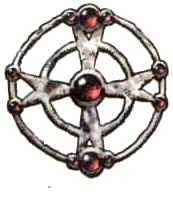St. Cuthbert

St. Cuthbert of the Cudgel
- Intermediate Deity
- Symbol: Ruby-studded starburst
- Home Plane: Arcadia
- Alignment: Lawful Neutral
- Portfolio: Retribution, common sense, wisdom, zeal, honesty, truth, discipline
- Worshipers: Fighters, monks, judges, constables
- Domains: Knowledge
The deity of retribution common sense and zeal, St. Cuthbert (saint cuhth-burt), takes many forms. He often masquerades as a common yokel or white-haired, mustached man in plate mail. He usually carries his famous mace.
St. Cuthbert exacts revenge and just punishment on those who transgress the law. Because evil creatures more commonly and flagrantly violate laws than good creatures do, St. Cuthbert favors good over evil, though he is not good himself. He may have once been a mortal man (as his worshipers claim), but if so it was long ago and from an unknown branch of humanity.
Dogma
The words of St. Cuthbert are wise, practical, and sensible. Among his followers, the Word of the Cudgel is law, and his followers take pains to spread the word so that may all may benefit from St. Cuthbert’s wisdom. Weakness in faith and acting against the Saint’s teachings are intolerable, especially in believers. St. Cuthbert exhorts his followers to make increasing efforts to bring unbelievers into the fold. Honesty, truthfulness, practicality, and reasonability are the highest virtues, says St. Cuthbert.
Clergy and Temples
Clerics of the Cudgel are stern folk who speak their minds plainly. They do not suffer fools and disapprove of those who backslide in faith. They train in the arts of war and keep themselves physically fit. Many serve as constables, detectives, judges, and bounty hunters.
Temples of St. Cuthbert are always solid and imposing. Their entrances or facades invariably feature inscriptions of quotations attributed to the Cudgel. These can be inspirational, such as: “Chaos and evil prevail where good folk do nothing.” Or even threatening, such as: “Obstinacy brings lumps to the heads of the unfaithful.”
Avatars
St. Cuthbert’s avatars vary in appearance, just as he does. He sends them to monitor the faithful or to reveal untruths.
 The Draconus Dictum
The Draconus Dictum